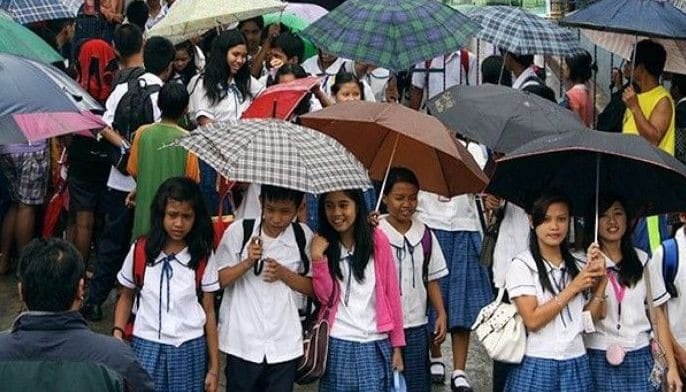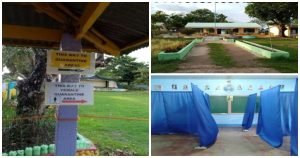The Department of Interior and Local Government (DILG) warns all mayors that the DILG will go after them and file charges if they fail to suspend classes in the event of floods, typhoons, and other calamities affecting their areas of responsibility.
DILG Undersecretary Epimaco Densing III added that the constituents of a particular town or city could also file a case against their mayors should they neglect to fulfill their duties and fail to suspend classes even when calamities strike their place.

Densing pointed out that announcements should be made not later than 4:30 AM for whole day cancellation or suspension and not later than 11:00 AM for afternoon cancellation or suspension.
DepEd or LGU responsibility?
Some local government units (LGUs) proposed that the decision for class cancellations and suspensions should revert to the Department of Education (DepEd), considering that schools are under the agency. However, Densing is not in favor of the suggestion.
He pointed out that each town and city in the country has a local disaster risk reduction and management council who can best assess the local situation, much better than the DepEd.

Meanwhile DepEd Secretary Leonor Briones said that the LGUs should retain the authority to determine and announce the class suspensions.
“It is usually the local officials who love their people, who immediately go out when there is a storm or a disaster. To find out what is happening, they go there very much faster and earlier than we could ever do so,” Briones explained.
“And the reason behind the policy of asking local government [to suspend classes] is in terms of timeliness. They would be much faster, because they’re right there where the storm is, where the flood is, where the earthquake is before the DepEd officials will ever have an opportunity to go.”
Briones believes that LGUs want to return the responsibility to DepEd out of fear they might be blamed for wrongful or delayed announcements.

“I think the issue here is who is [blamed or] who gets the blame. Who gets the blame? Some local government units are not happy about being blamed as to the timeliness of the decision,” Briones said.
“[But] local government units are so much more on the ground and they know what is really happening… As I said, local officials, especially at this time, I’m very sure, they’re very concerned and they love their constituents, especially the children and the parents of the children.”
Guidelines for Suspension of Classes
DO 43, s. 2012 – Guidelines on the Implementation Of Executive Order No. 66 (Prescribing Rules on the Cancellation or Suspension of Classes and Work in Government Offices Due to Typhoons, Flooding, Other Weather Disturbances, and Calamities)
To: Undersecretaries
Assistant Secretaries
Bureau Directors
Directors of Services, Centers and Heads of Units Regional Directors
Schools Division/City Superintendents
Heads, Public and Private Elementary and Secondary Schools
All Others Concerned
The Guidelines on the Implementation of Executive Order (EO) No. 66 dated January 9, 2012, entitled “Prescribing Rules on the Cancellation or Suspension of Classes and Work in Government Offices Due to Typhoons, Flooding, Other Weather Disturbances and Calamities, ” is issued to streamline the procedure on the suspension of classes and work in government offices in times of typhoons, floods, and other disasters or calamities to spare the pupils, students, teachers and government workers and the general public from unnecessary dangers to their lives and limbs.
In compliance thereof, the following guidelines shall be observed by all concerned regional, division, and school officials of both public and private schools:

Photo credit: PhilStar
a. Automatic Cancellation/Suspension of Classes
All concerned DepEd officials and personnel are directed to observe the weather bulletins of the Philippine Atmospheric Geophysical and Astronomical Services Administration (PAGASA) announced through various media outlets (radio, television, and internet).
When Signal No. 1 is raised by PAGASA, public and private preschool and kindergarten classes in the affected areas shall be automatically cancelled or suspended.
When Signal No. 2 is raised by PAGASA, public and private preschool, kindergarten, elementary and secondary classes in the affected areas shall be automatically cancelled or suspended.
When Signal No. 3 is raised by PAGASA, work in all DepEd offices in the affected areas shall be automatically cancelled or suspended.
Depending on signal numbers declared at 10:00 p.m. and 4:30 a.m. of the following day, classes in appropriate levels for the whole day are deemed automatically cancelled/suspended.
Afternoon classes in the appropriate levels in areas with signal numbers declared at 11:00 a.m. that day are likewise automatically cancelled/suspended.
Teaching personnel handling cancelled or suspended classes are likewise allowed to leave their stations in consideration of the work they will need to undertake during make-up classes.
Heads of private schools shall exercise discretion on their teaching personnel handling cancelled or suspended classes.
b. Localized Cancellation/Suspension of Classes and Work
In the absence of typhoon signal warnings from PAGASA, localized cancellation/suspension of classes in both public and private schools and work in government offices may be implemented by local chief executives in their capacity as chairpersons of the Local Disaster Risk Reduction and Management (LDRRMC).
Concerned local DepEd and private school officials are directed to establish effective lines of communications with their respective local government units (LGUs).
Any decision to cancel or suspend classes must come from the local government. A school head (SH) may only cancel or suspend classes in cases where urgent action is needed to prevent loss of life or bodily harm.
As stated in Section 2 of EO No. 66, LGU officials are expected to announce cancellation or suspension not later than 4:30 a.m. for whole day cancellation or suspension, or not later than 11:00 a.m. for afternoon cancellation or suspension.
For this purpose, regional, division and school officials are hereby directed to communicate local situation with their respective counterpart local chief executive.
c. Cancellation/Suspension of Classes and Work During Other Calamities
Decisions on and subsequent announcement of cancellation/suspension of classes in public and private schools and work in government offices in areas affected by disasters or calamities other than typhoons, such as but not limited to floods, earthquakes, tsunamis and conflagration, shall be made by the local government executive as chairperson of the LDRRMC, in coordination with the National Disaster Risk Reduction Management Council (NDRRMC), through all forms of mass media available under the circumstances.
d. Maintenance of Work Force
Regional and Division Offices shall activate their Regional or Division Disaster Risk Reduction Offices (DRRMO) to monitor the situation and keep lines of communications open.
e. Reporting
Standard reporting procedures between Regional and Division DRRMOs with the Central Office DRRMO applies.
Standard procedures in communicating with the LDRRMC and Regional Disaster Risk Reduction Management Council (RDRRMC) shall likewise apply.
f. Announcements
The DepEd spokesperson, regional directors (RDs), schools division/city superintendents (SDSs), central, regional and division communication officers, in interviews, should only confirm or re-echo automatic cancellation/suspension of classes after it is officially published by PAGASA. No announcement should originate from the Department. If interviewed by media, announcement should always be made in reference to what PAGASA has already announced in areas under a typhoon signal, and to local chief executives in the absence of a typhoon signal.
Based on Section 3 of EO No. 66, announcement of local cancellation/suspension of classes shall be made by the local chief executives. In cases where urgent action is needed to prevent loss of life or bodily harm, the school head is expected to make the announcement and subsequently inform the local executive.
g. Absences of Tropical Cyclones/Storm Signal Warning
In cases where PAGASA has not raised any storm signal warning or declared the presence of a tropical cyclone, Regional and Division DRRMOs are directed to communicate with their counterpart RDRRMC and LDRRMC for any decision to cancel or suspend classes in their respective locality.
h. Responsibility of Parents
The DepEd still maintains that parents have the ultimate responsibility for determining whether their children should go to school, even if no order for cancellation/suspension of classes has been issued, if they feel that traveling to or from school will place their children at risks.
Parents are advised to check for media advisories coming from PAGASA, NDRRMC, RDRRMCs, LDRRMCs or the Office of the President itself.
Parents and teachers are reminded that the required number of school days for the school year shall be considered especially in holding make-up classes to offset the days when classes are cancelled/suspended. These make-up classes shall be held on Saturdays or on weekdays beyond the originally set school calendar in both public and private schools.
School officials, members of the DRRMCs in schools designated as evacuation centers are requested to render service even when classes are suspended. They shall coordinate with the local government official on rules, orders, and guidelines prescribed for evacuation centers.
All previous orders and regulations relevant to the cancellation/suspension of classes due to any weather disturbance or calamities are rescinded.
Immediate dissemination of and compliance with this Order is directed.
Reference: DepEd Order: No. 81, s. 2010



